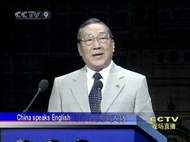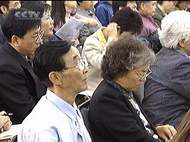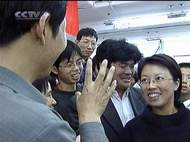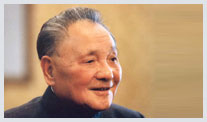|
China speaks English 
|
| 2002-10-15 16:34:13 |
Over the past six days, we've shown how the reform and opening-up policy Beijing initiated more than 20 years ago has breathed new life into Chinese society. Now, the policy has the country firmly on the world's fast track. But for ordinary Chinese citizens, catching up with the early birds is not that easy. Among other things, it requires them to grapple with their proficiency in other people's languages -- English in particular.
 No wonder in recent years that top Chinese leaders speak in English to their international audiences. Their good command of the world's de facto lingua franca reflects how deeply China has come to communicate with its global village neighbors.
No wonder in recent years that top Chinese leaders speak in English to their international audiences. Their good command of the world's de facto lingua franca reflects how deeply China has come to communicate with its global village neighbors.
And they've even inspired the nation's younger generation, like this teenaged student who believes English can help him to earn international fame. "Because English is international language. I have a dream. I want to be famous," said a 13-year-old boy. The boy's ambition is driven by a government-funded public lecture in Beijing.
The lecture has been held every weekend at the Beijing Foreign Languages Bookstore since early this year. Of course, the beneficiaries are people from all walks of life.
 This retired state-owned enterprise official gets his own taste of English. "I come here every weekend because I love speaking English," said Jia Yiyong, a 67-year-old retiree.
This retired state-owned enterprise official gets his own taste of English. "I come here every weekend because I love speaking English," said Jia Yiyong, a 67-year-old retiree.
Although an estimated 70 percent of urban Chinese have studied English, the language is so different from their native tongue that most find they just aren't able to use what they've learned.
The government's campaign to promote the foreign language among the public is crucial for the Chinese to speak proper English.
"This year, the city government has called on all the citizens to study foreign languages and provide an international language environment for foreign friends coming to China and Beijing's communication with the world. Over one million citizens, which is the 10 percent of the total population of the whole city, have joined the foreign languages speaking program," said Liu Yang from Beijing municipal government.
 The efforts could be dated back to as early as 1982, when CCTV launched the Chinese edition of Follow Me, a BBC English teaching program. As the country's first televised English program, it was a landmark.
The efforts could be dated back to as early as 1982, when CCTV launched the Chinese edition of Follow Me, a BBC English teaching program. As the country's first televised English program, it was a landmark.
Twenty years on, China has become the world's largest market for English learning. A recent figure indicates, in Beijing alone, thousands of language schools are competing for the annual profit of up to two billion yuan (230 million US dollars).
To the young people, English can be a passport to an education abroad and a high-salaried job with a foreign firm in China. And for the senior citizens, conquering a foreign tongue, according to doctors, is a healthy way not to grow old.
|
|










